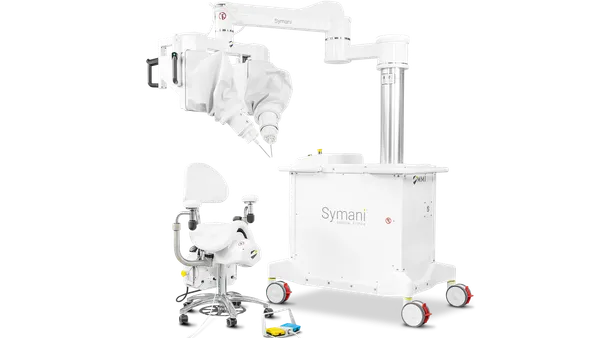Dive Brief:
-
FDA on Friday approved Edwards' Sapien 3 Transcatheter Heart Valve (THV) System and Ultra THV System for severe aortic stenosis patients with low risk for open heart surgical valve repair.
-
Medtronic also won an expanded indication for its Evolut Transcatheter Aortic Valve Replacement (TAVR) system for low-risk patients.
-
The expanded indication could make approximately 165,000 low-risk patients per year in the U.S., Western Europe and Japan eligible for TAVR, Medtronic estimates, a population it and Edwards will be keen to treat. Aortic stenosis occurs when the heart's aortic valve becomes diseased and its leaflets struggle to open and close properly.
Dive Insight:
The FDA decision to approve the expanded indications for low-risk patients follows the release of results from two landmark studies at the American College of Cardiology annual meeting in March.
Data from the Partner 3 trial published in the New England Journal of Medicine in March showed TAVR with Edwards' device was superior to conventional surgery in preventing death, stroke and repeat hospitalization at one year in 1,000 severe aortic stenosis patients.
Medtronic's Evolut Low Risk trial, also published in NEJM, found TAVR was as good as open surgery on measures of mortality and disabling stroke at two years in a group of 1,403 patients.
University of Colorado cardiothoracic surgeon Joseph Cleveland, who has implanted both Medtronic and Edwards valves, told MedTech Dive he was not surprised by the dual approval despite Edwards' system appearing more effective in beating open surgery's outcomes.
"The intent was to prove equivalence," Cleveland said of both the Medtronic and Edwards trials.
Edwards' product features a balloon-expanding mechanism, while Medtronic's technology is self-expanding.
The widened indication for Sapien 3, first approved by FDA at the end of 2018, follows Edwards' announcement on its third quarter earnings call last month it would stop producing its Centera valves to focus on the Sapien line.
Medtronic hopes Evolut will see higher adoption than its competitors among younger low-risk patients, Nina Goodheart, vice president of Medtronic's structural heart unit, told MedTech Dive.
"We believe that Evolut will be preferred for low risk patients who may be younger and more active due to its superior hemodynamic performance, which promotes increased blood flow for an active lifestyle," Goodheart said in an email.
Edwards and Medtronic must continue to monitor patients enrolled in their studies for 10 years to evaluate long-term valve durability and the safety and effectiveness of the devices. The companies also must provide FDA with surveillance data through the Society of Thoracic Surgeons/American College of Cardiology Transcatheter Valve Therapy Registry.
"As the FDA assesses new medical technologies or expanded uses for previously approved products such as these, the agency remains committed to evaluating evidence from clinical trials and real-world clinical data in both the premarket and postmarket settings to ensure patients have access to high-quality, safe, and effective medical devices," Bram Zuckerman, director of FDA's Office of Cardiovascular Devices, said in a statement.
Competitor Boston Scientific, whose Lotus Edge TAVR device was approved by FDA in April for patients at high risk for open heart surgical valve replacement, has not been authorized for use in low-risk patients. Earlier this year, the company began enrolling intermediate-risk patients in the REPRISE IV clinical to evaluate its Lotus Edge Valve System, according to spokesperson Trish Backes.
Not only is the population eligible for TAVR expanding -- the number of sites performing the procedures is too. CMS in June issued new reimbursement rules for medical centers performing TAVR procedures, aiming to ease barriers to entry for hospitals wishing to adopt the technology while maintaining volume standards.
The policy stated hospitals seeking to start a TAVR program must have completed at least 50 open heart surgeries in the prior year and 20 aortic valve-related procedures within the previous two years. Hospitals that already have a CMS-supported TAVR program are required to complete at least 50 transcatheter or surgical aortic valve replacements each year, or at least 100 every two years, with a minimum of 20 TAVR procedures in the prior year.
"With the low risk approval, risk stratification for TAVR treatment is becoming obsolete and heart teams will likely need to assess treatment options based on anatomical characteristics, concomitant risk factors and also patient preference," Michael Reardon, cardiothoracic surgeon at Houston Methodist DeBakey Heart & Vascular Center and principal investigator of the Evolut Low Risk Trial, said in a Medtronic statement.










